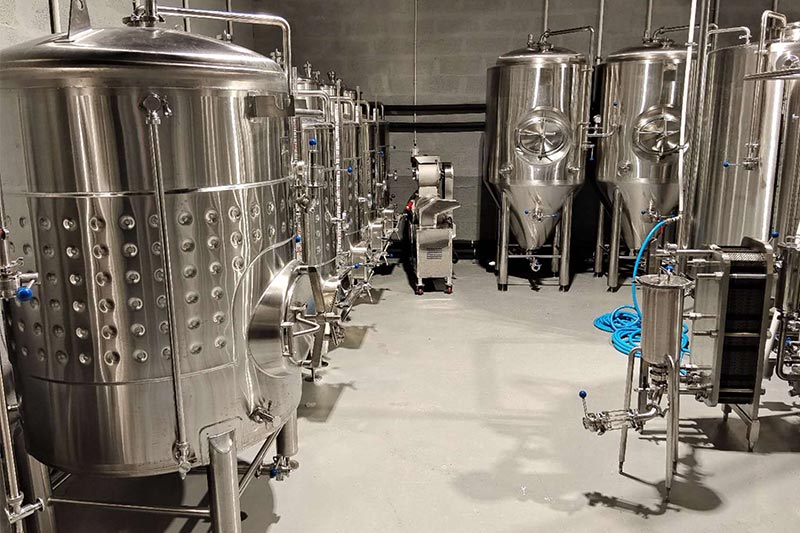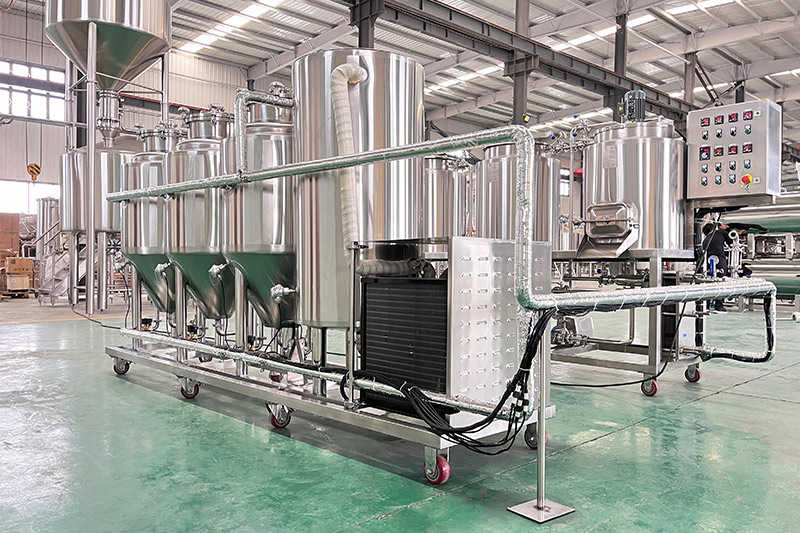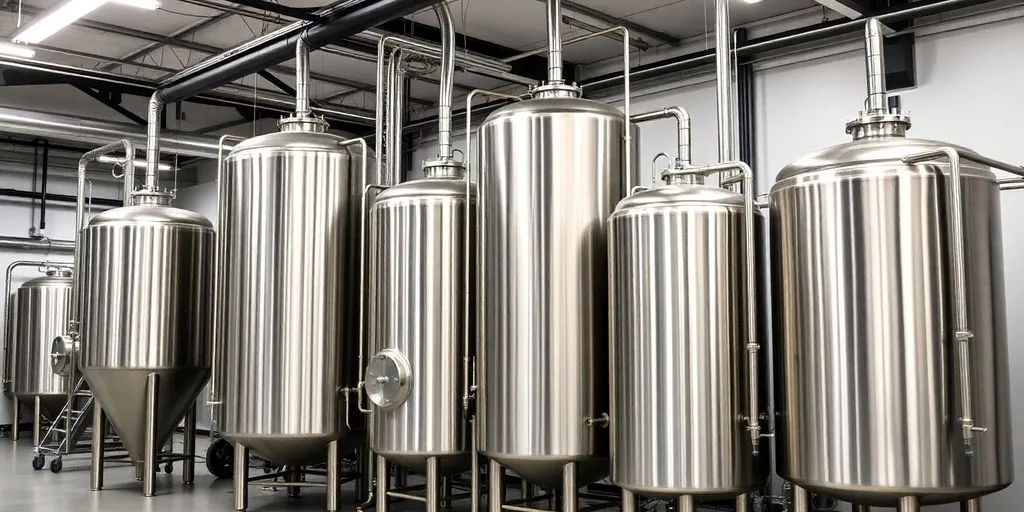Discover how you can brew high-quality beer without breaking the bank. This guide will introduce you to affordable beer brewing equipment that doesn’t compromise on quality. Whether you’re starting a new brewery or looking to upgrade your existing setup, find out how the right brewing equipment can make all the difference.

Table of Contents
What Is the Essential Brewing Equipment for Your Brewery?
Starting a brewery requires investing in the right brewing equipment. The essentials include:
- Brew Kettle: Where you brew your beer.
- Fermenter: For the fermentation process.
- Grain Mill: To prepare grains for mash.
- Chiller: To cool down the wort after boiling.
- Temperature Control Devices: To maintain optimal conditions.
These pieces form the backbone of any successful brew system.
Equipment and Supplies
Having the correct equipment and supplies ensures a smooth brewing process. Quality doesn’t have to be expensive. Our manufacturing plant specializes in affordable yet high-quality beer brewing equipment that caters to both new and established breweries.
How to Choose the Right Brew System for Effective Brewing
Selecting the right brew system is crucial for effective brewing. Consider the following:
- Batch Size: Determine how much beer you plan to brew per batch.
- Scalability: Ensure the system can grow with your brewery.
- Space Constraints: Assess the physical space available.
- Budget: Find a balance between cost and quality.
Used Equipment vs. New Equipment
While buying used equipment might seem cost-effective, investing in new, affordable brewing equipment often provides better longevity and reliability. Plus, modern systems come with updated features that enhance the brewing process.
Electric Brew Systems: Are They Right for You?
An electric brew system offers precise temperature control and ease of use.
Benefits of Electric Brew Systems
- Efficiency: Electric systems heat up quickly, saving time.
- Control: Precise adjustments lead to consistent results.
- Safety: Reduced risk of open flames in your brewery.
- Cleanliness: Electric systems are easier to clean and maintain.
From my experience, switching to an electric brew system streamlined our operations and improved the quality of each batch.
Why Stainless Steel Kettles Are a Brewer’s Best Friend
A stainless steel kettle is a must-have in any brewery.
Advantages of Stainless Steel
- Durability: Resistant to corrosion and lasts longer.
- Cleanliness: Easy to sanitize, maintaining beer purity.
- Heat Retention: Ensures even heating during the brew.
Investing in a stainless steel brew kettle enhances the overall beer brewing experience.
The Importance of a Grain Mill in Home Brew
A grain mill allows you to grind grains to your desired consistency.
Benefits
- Freshness: Milling grains on-demand ensures freshness.
- Customization: Control over the mash process for unique flavors.
- Cost Savings: Buying grains in bulk reduces costs.
For home brew enthusiasts, a grain mill is indispensable for crafting unique beer recipes.
Understanding Fermentation: The Role of Fermenters
Fermentation is where the magic happens in beer brewing.
Types of Fermenters
- Plastic Buckets: Affordable but may retain flavors.
- Glass Carboys: Non-porous but fragile.
- Stainless Steel Fermenters: Durable and easy to clean.
Choosing the right fermenter affects the quality and taste of your final product.

How Does Temperature Control Affect Fermentation?
Maintaining proper temperature control during fermentation is key.
Why It Matters
- Yeast Activity: Yeast performs best within specific temperature ranges.
- Flavor Profiles: Temperature affects the development of flavors.
- Consistency: Stable temperatures produce consistent results.
Using equipment with accurate temperature control ensures each batch of beer meets your standards.
The Role of Chillers in Effective Brewing
A chiller rapidly cools the wort after boiling.
Types of Chillers
- Immersion Chillers: Submerged directly in the wort.
- Counterflow Chillers: Wort flows through tubing surrounded by cold water.
- Plate Chillers: Wort and cold water pass through alternating plates.
Rapid cooling reduces the risk of contamination and improves clarity.
All-Grain vs. Extract Brewing: What’s the Difference?
Understanding the difference helps you decide which method suits you.
All-Grain Brewing
- Process: Uses malted grains for the mash.
- Control: Greater influence over flavor and body.
- Equipment: Requires more brewing equipment like a mash tun.
Extract Brewing
- Process: Uses malt extract syrup or powder.
- Convenience: Less time-consuming and equipment-intensive.
- Ideal For: Beginners or those with limited space.
Both methods can produce excellent beer; it depends on your preference and resources.
How to Insulate Your Brew System for Optimal Efficiency
Insulation is crucial for maintaining temperatures.
Methods
- Insulating Jackets: Removable covers for kettles and fermenters.
- Foam Insulation: Applied directly to equipment.
- Reflective Wraps: Reflects heat back into the system.
Proper insulation ensures energy efficiency and consistent brewing conditions.
FAQs
A basic setup includes a brew kettle, fermenter, chiller, grain mill, and temperature control devices.
While you can use home brew equipment for small-scale production, investing in commercial-grade brewery equipment is advisable for consistency and scalability.
Prices vary, but starters can expect to spend between $100 to $500 on a brewing kit. For commercial setups, costs are higher but scalable.
Stainless steel is durable, easy to clean, and doesn’t react with the beer, preserving its flavor.
While not mandatory, a chiller significantly improves the quality by quickly cooling the wort, reducing the risk of contamination.
Our Nano Brewery Equipment offers cost-effective solutions without compromising on quality.
Conclusion
Investing in the right brewing equipment is essential for crafting great beer, whether you’re a home brewer or running a brewery. Affordable options are available that provide durability and efficiency. Our manufacturing plant specializes in providing cheap brewery equipment to help you brew the best beer without stretching your budget. Contact us today to explore equipment that fits your needs and elevates your brewing game.
Key Takeaways
- Invest Wisely: Quality brewing equipment doesn’t have to be expensive.
- Essential Gear: Focus on key items like kettles, fermenters, and chillers.
- Temperature Matters: Control is crucial during the brewing process.
- Customize Your Brew: Equipment like grain mills allow for personal touches.
- Maintenance: Proper insulation and maintenance extend equipment life.

Elevate your brewing with our high-quality, affordable equipment. Contact us to get started!
Looking for more specialized equipment? Check out our Beer Brewing Equipment and Microbrewery Equipment for a wider selection.Explore our Beer Brewing System to find the perfect match for your brewing style.Don’t forget to consider our Conical Fermenters for optimal fermentation control.

